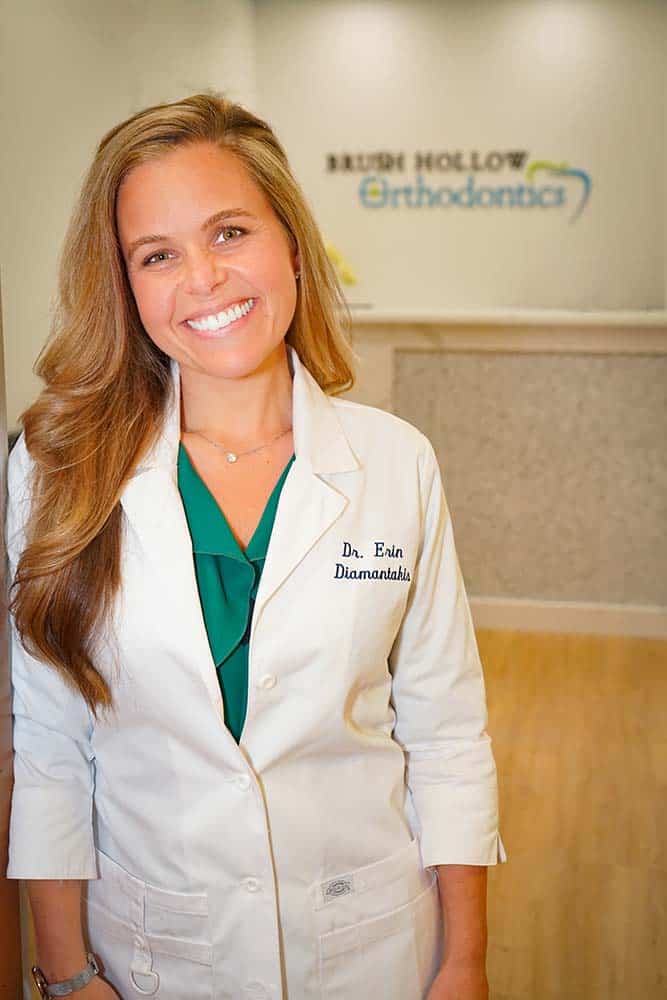
Surviving Your First Month with Braces: What to Expect from Westbury Orthodontic Treatment
The first month with braces represents a critical adjustment period for new orthodontic patients in Westbury. As someone who helps patients navigate this transition at Brush Hollow Orthodontics, I’ve witnessed firsthand how proper preparation and knowledge can make this period much more manageable. Westbury residents considering traditional braces often have many questions about what to expect during those initial weeks. Whether you’re a teen or adult starting treatment at Brush Hollow Orthodontics, understanding what lies ahead will help you navigate this important first phase with confidence.
Do Braces Hurt on the First Day?
Braces typically cause mild to moderate discomfort on the first day rather than acute pain. Most Westbury patients experience pressure and soreness as teeth begin responding to initial adjustments. This discomfort results from the brackets and wires placing a gentle force on your teeth to initiate movement.
The sensation is often described as:
- A constant, dull pressure across multiple teeth
- Heightened sensitivity when biting or chewing
- Occasional irritation where the brackets contact the inside of your cheeks
How Long Do Your Teeth Hurt After Getting Braces?
Most patients experience tooth discomfort after getting braces for 3-7 days. The initial soreness peaks during the first 48-72 hours before gradually subsiding. Your mouth needs this time to adjust to the new appliances and the initial tooth movement. By the end of the first week, most patients report significantly reduced discomfort and improved ability to eat and speak normally.
What Pain Relief Options Work Best for New Braces in Westbury?
Several effective pain relief options help Westbury patients manage initial braces discomfort:
- Over-the-counter pain relievers like acetaminophen or ibuprofen taken as directed
- Dental wax applied to brackets that irritate the cheek tissue
- Cold foods or ice water to temporarily numb sensitive areas
- Warm salt water rinses (1 teaspoon salt in 8 oz warm water) to reduce inflammation
- Orthodontic anesthetic gels applied directly to sore spots
Remember to follow Dr. Erin’s recommendations, as they may provide products specifically designed for orthodontic discomfort.
Is Discomfort Normal After Getting Braces Tightened?
Discomfort after adjustment appointments is entirely normal and follows a predictable pattern. When your braces get tightened, you’ll likely experience renewed pressure for 24-48 hours. This discomfort is a positive sign that your teeth are responding to treatment and moving toward their ideal positions. The good news is that tightening discomfort typically lasts for a shorter duration than the initial discomfort experienced when braces are first placed.
What to Eat on the First Day of Braces?
On your first day with braces, you should consume only soft foods that require minimal chewing. Your teeth will be sensitive, and you’ll need time to adjust to eating with your new appliances. Ideal first-day food choices include yogurt, smoothies, mashed potatoes, soup, and pasta.
What Can I Eat with Braces on the First Day?
You can eat these braces-friendly foods on your first day:
- Yogurt and pudding (high in calcium and protein)
- Smoothies with yogurt, fruit, and protein powder
- Well-cooked pasta with soft sauce
- Mashed potatoes, sweet potatoes, or avocados
- Scrambled eggs or egg salad
- Soft bread without crusts
- Soups and broths (lukewarm, not hot)
- Ice cream or popsicles (the cold can help reduce discomfort)
What Not to Eat After Getting Braces?
Several foods should be avoided completely after getting braces to prevent damage:
- Hard foods like nuts, ice, and hard candies
- Chewy foods like bagels, licorice, and tough meats
- Crunchy foods like popcorn, chips, and raw carrots
- Sticky foods like caramel, gum, and gummy candies
- Foods you bite into like whole apples, corn on the cob, and crusty bread
- Very sugary foods that can lead to plaque buildup around brackets
How Long After Getting Braces Can You Eat Solid Food?
Most patients begin transitioning to softer solid foods approximately 3-5 days after getting braces. Your ability to handle solid foods depends on your comfort level and how quickly your mouth adapts. Start with easy-to-chew foods like pasta, soft-cooked vegetables, and tender meats before attempting anything firmer. Within 7-10 days, many Westbury braces patients find they can eat a wider variety of foods, though certain restrictions will remain throughout treatment.
Can I Brush My Teeth After Getting Braces?
You should brush your teeth the same day you get braces, but with gentle pressure. Your orthodontist will likely provide initial brushing instructions before you leave the office. Use lukewarm water rather than cold if your teeth are sensitive, and be especially gentle around the brackets and wires. Regular brushing from day one establishes the vital habit of keeping your braces clean.
How to Brush Your Teeth the First Day with Braces?
On your first day with braces, follow these steps for effective brushing:
- Rinse with water before brushing to loosen food particles
- Apply a small amount of fluoride toothpaste to a soft-bristled brush
- Brush at a 45-degree angle above each bracket, then below each bracket
- Clean each tooth surface for at least 10 seconds
- Brush your tongue and the roof of your mouth
- Rinse thoroughly with water
- Examine your braces in a mirror to check for any remaining food particles
If traditional brushing causes discomfort on the first day, try using a finger brush or gauze pad with toothpaste as a temporary alternative.
What Happens in the First Month of Braces?
The first month of braces treatment initiates the tooth movement through controlled force application. Your teeth begin shifting gradually as the archwire exerts pressure through the brackets. During this period, your mouth adapts to the presence of orthodontic appliances, with initial irritation giving way to increased comfort. You’ll develop new oral hygiene routines and adjust your eating habits to accommodate your braces.
Do Your Teeth Move in the First Month of Braces?
Though the changes may be subtle, your teeth begin moving during the first month of braces. Initial movement focuses on alignment rather than major repositioning. Most patients notice slight changes in how their teeth feel rather than dramatic visual differences. This early movement creates space for more significant changes throughout your treatment plan.
How Long After Getting Braces Do You See Results?
For most patients, visible results from braces typically appear within 4-6 weeks. Initial changes often include reduced crowding and slight alignment improvements. The most noticeable early changes usually occur with front teeth, which tend to respond quickly to orthodontic pressure. Remember that orthodontic treatment is a marathon, not a sprint. Significant transformations become more apparent after several months of consistent wear.
What to Expect at Your First Adjustment Appointment in Westbury
Your first adjustment appointment in Westbury typically includes:
- Removal of the initial archwire
- Cleaning around brackets, if needed
- Assessment of initial tooth movement
- Placement of a new, possibly slightly stronger archwire
- Replacement of colored elastics if used
- Discussion about your comfort and addressing any concerns
- Oral hygiene evaluation and tips for improvement if needed
These appointments usually last 20-30 minutes and are less involved than your initial braces placement. Westbury orthodontists typically schedule these appointments 4-6 weeks after initial placement.
What to Do After Getting Braces?
After getting braces, focus on establishing good oral hygiene routines and following food restrictions carefully. Take photos to document your starting point for comparison later. Stock your home with braces-friendly foods and necessary oral care products. Take over-the-counter pain relievers for discomfort, and use dental wax on any irritating brackets or wires. Adult orthodontic patients may need additional workplace accommodations during this adjustment period.
How to Sleep Comfortably with New Braces
Sleeping comfortably with new braces requires these adjustments:
- Use an extra pillow to elevate your head slightly, reducing overnight pressure
- Sleep on your back when possible to avoid direct pressure on your brackets
- Apply dental wax to any brackets that irritate your cheeks while sleeping
- Take approved pain relievers before bedtime during the first few nights
- Use a clean, soft cloth with cold water on your cheeks before sleep to reduce inflammation
- Consider a specially designed orthodontic pillow if sleep discomfort persists
Most sleep discomfort resolves within the first week as your mouth adapts to the braces.
When Should You Contact Your Westbury Orthodontist?
Contact your Westbury orthodontist immediately if you experience:
- A broken bracket or wire
- A wire poking into your cheek or gum
- Severe pain that doesn’t respond to over-the-counter pain relievers
- Significant injury to your mouth while wearing braces
- A loose band or bracket
- Inability to eat or drink due to discomfort after 5+ days
For minor issues, call during regular hours for guidance. Most Westbury orthodontic practices, including Brush Hollow Orthodontics, offer emergency contact information for after-hours orthodontic emergencies.
Frequently Asked Questions (FAQs)
What Are the 5 Stages of Braces Treatment?
The five stages of braces treatment include:
- Initial placement and bonding of brackets
- First alignment phase, where light wires begin shifting teeth
- The working phase should have stronger wires and possibly elastics to address specific movements
- The finishing phase should have final adjustments for ideal alignment
- The retention phase should use retainers to maintain results
Each stage builds upon the previous one, with the first month falling within the initial alignment phase, where your teeth begin responding to orthodontic pressure.
How Do Faces Change After Braces?
Faces can change subtly after braces treatment through improved dental alignment and jaw positioning. Common positive changes include better lip support, improved profile balance, correction of overbites or underbites affecting facial proportions, and more natural resting positions for the mouth. These changes typically occur gradually throughout treatment rather than during the first month, though patients with severe misalignment may notice early facial improvements as teeth begin moving into better positions.
When Do Braces Start to Feel Normal?
Braces typically start feeling normal within 2-3 weeks for most Westbury patients. The initial foreign sensation of brackets and wires gradually becomes your new normal as your mouth develops calluses where brackets contact tissue, and your brain adapts to the appliance’s presence. By the one-month mark, most patients report no longer constantly noticing their braces, though awareness returns briefly after adjustment appointments. The adjustment process happens faster for younger patients whose tissues adapt more quickly.
Conclusion
The first month with braces represents a significant adjustment period, but Westbury patients can navigate this transition successfully with the right knowledge and preparation. We’ve covered everything from managing initial discomfort and adapting your diet to establishing effective cleaning routines and understanding the early stages of tooth movement. Remember that these first few weeks’ temporary discomfort and lifestyle adjustments are stepping stones toward the long-term reward of a beautifully aligned smile that can last a lifetime. Our experienced orthodontic team is committed to supporting you through every stage of treatment.
Your Next Step in Westbury
Ready to begin your orthodontic journey or need support during your first month with braces? Schedule a personalized consultation at Brush Hollow Orthodontics in Westbury using our online appointment system. Our Westbury orthodontic specialists will create a customized treatment plan addressing your specific dental alignment needs, answer all your questions about the initial adjustment period, and provide the tools you need for a comfortable transition to life with braces. Don’t let uncertainty about the first month keep you from achieving the confident smile you deserve. Take the first step with Westbury’s trusted orthodontic team, led by Dr. Erin, today.

